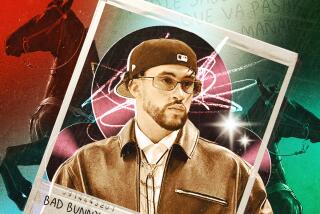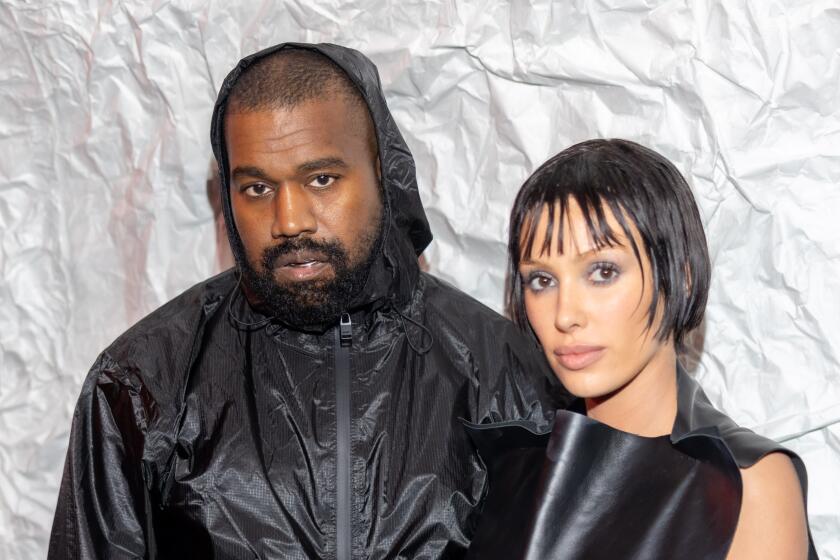Review: Randy Newman was as low-key — and as brilliant — as ever at the Hollywood Bowl
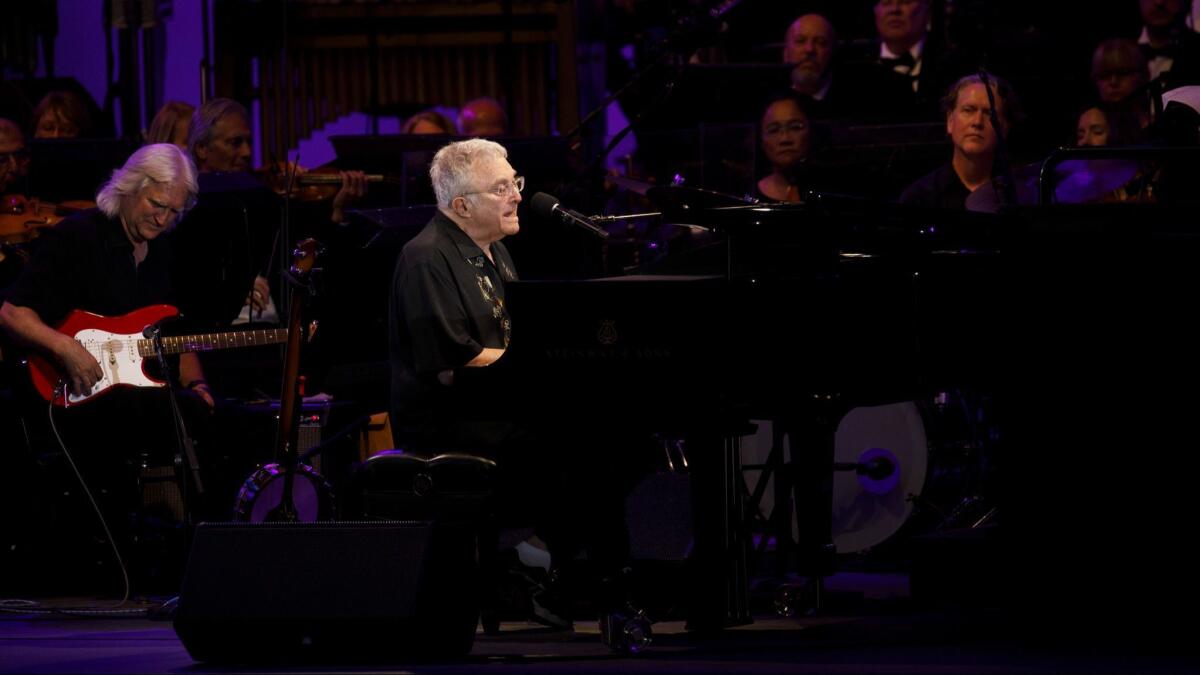
Randy Newman shuffled onstage like he was walking into his optometrist’s office: black pants, black bowling shirt, chunky sneakers meant to provide some comfort should he have to wait anywhere for a while.
In fact, he was at the Hollywood Bowl, the main attraction Sunday night in a somewhat grand affair celebrating his half-century as a maker of records. Surrounded by a four-piece band and the formally attired members of the Hollywood Bowl Orchestra, the 74-year-old singer and songwriter casually took his place behind a grand piano and peered out at the audience.
“Randy Newman,” he said with a priceless little shrug. “You know who it is?”
His typically low-key manner shouldn’t have led anyone to think that Newman didn’t care about the gig, which lived up to its billing — “Randy Newman: The Albums 1968-2018,” it was called — with renditions of tunes as old as the elegiac “Cowboy,” from his self-titled debut, and as fresh as “Putin,” a sly ditty about the Russian president from last year’s “Dark Matter.”
Playing with an orchestra — one conducted Sunday by Newman’s cousin, the film composer David Newman — seemed especially to delight the Los Angeles native who himself has worked plenty in Hollywood, including on the scores for “The Natural” and the “Toy Story” movies.
“I love musicians, and I always have,” he said at one point, waving toward the men and women in tuxedos and gowns. “They’re people who’ve accumulated tens of thousands of hours alone in a room getting good at what they do — much like snipers do.”
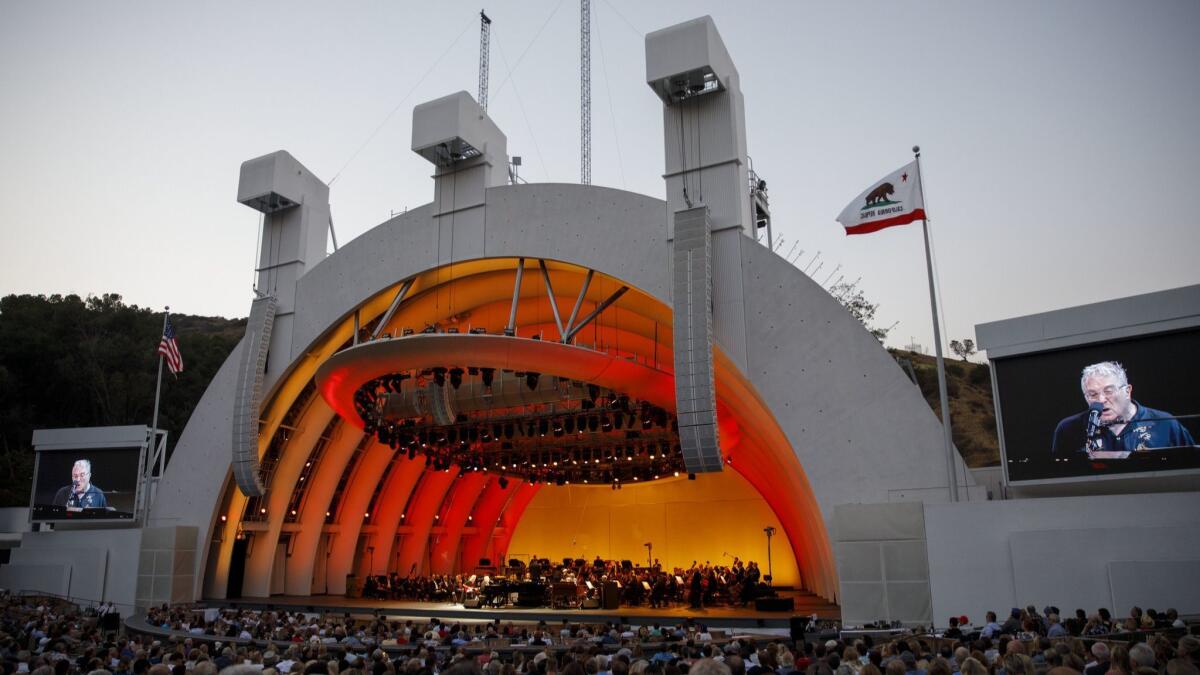
But even a carefully planned showcase in his cherished hometown wasn’t a reason to get all goopy about everything. And besides, he seemed to figure, the songs were probably speaking for themselves, right?
Did they ever.
“Marie” was a perfectly phrased portrait of a guy who knows he doesn’t deserve his lover. “Dixie Flyer” and “Sail Away” caught the idealism as well as the hypocrisy of the American dream. “Political Science,” with its promise to “drop the big one and see what happens,” felt funnier and truer than it has in years.
“They don’t laugh in Europe anymore,” he muttered after that one.
Though he resisted any urge to ramble on, Newman offered a bit of background on several numbers, and his faux-offhand comments were of course as writerly as his lyrics.
“The World Isn’t Fair,” he told us, grew out of his fascination with the progressive private school where he sent his two youngest kids after his two oldest were booted from a humbler academy.
“The teacher who threw them out said they were vicious and malicious,” Newman recalled. “I said, ‘That’s not their names.’”
Later, he introduced “I’m Dead (But I Don’t Know It)” with a bit about how many “old gray-hair rockers” — not that he knows any — are still out on the road scooping up fans’ money.
“Why quit?” he said. “No one taps you on the shoulder, says, ‘You’re really washed up — you oughta hang it up.’ And no one’s applauding at home, so everybody just keeps going.” He paused.
“I don’t know what’s gonna stop it.” Another beat. “An elephant gun.”
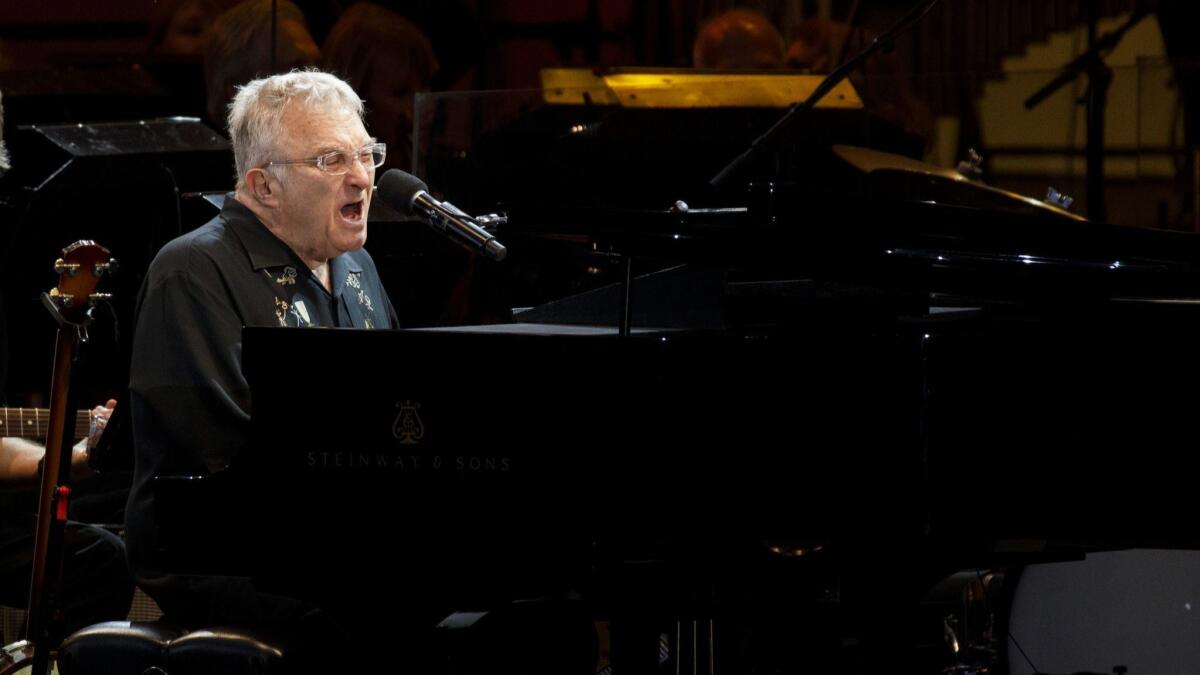
Occasionally the orchestral accompaniment stiffened material that called for a more relaxed touch. In “Mama Told Me Not to Come,” for instance, the strings and brass couldn’t quite hang with the band’s laid-back funk groove, which made Newman look like precisely the opposite of the guy he’s describing in the song: a hipster who suddenly finds himself in Squaresville.
“You Can Leave Your Hat On” felt similarly clunky, though Newman went some way toward redeeming it afterward by explaining how Tom Jones and Joe Cocker had successfully tweaked the song to make it more sensual.
“One of the things they did was they did it up like a sixth,” he said, demonstrating on the keyboard. “I mean, they’re real excited about sex. I was noncommittal. I was on the fence.”
Yet there was no denying the value those strings added in a tune like “Louisiana 1927,” Newman’s account of a Southern city being washed away, which sounded as beautiful at the Bowl as it ever has — pure American soul music, as deep and true as Ray Charles or Aretha Franklin.
The place was so still when Newman finished the song that he seemed almost embarrassed by it.
Fortunately for him, intermission beckoned.
“We’re gonna take a break and we’re gonna shoot up and then come out and do the rest of the show,” he said to great laughter out in the house.
“I know,” he added. “It’s not funny.”
Twitter: @mikaelwood
More to Read
The biggest entertainment stories
Get our big stories about Hollywood, film, television, music, arts, culture and more right in your inbox as soon as they publish.
You may occasionally receive promotional content from the Los Angeles Times.


